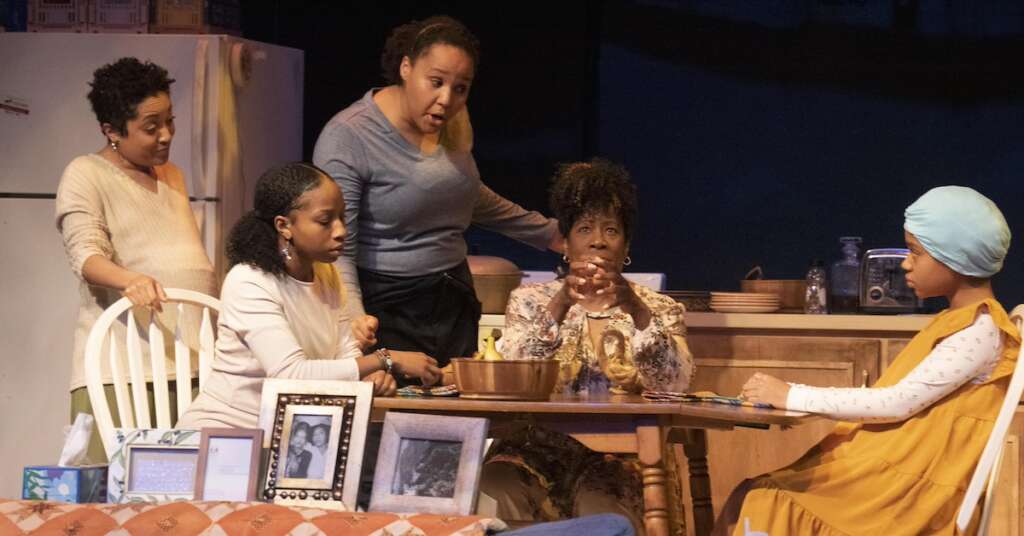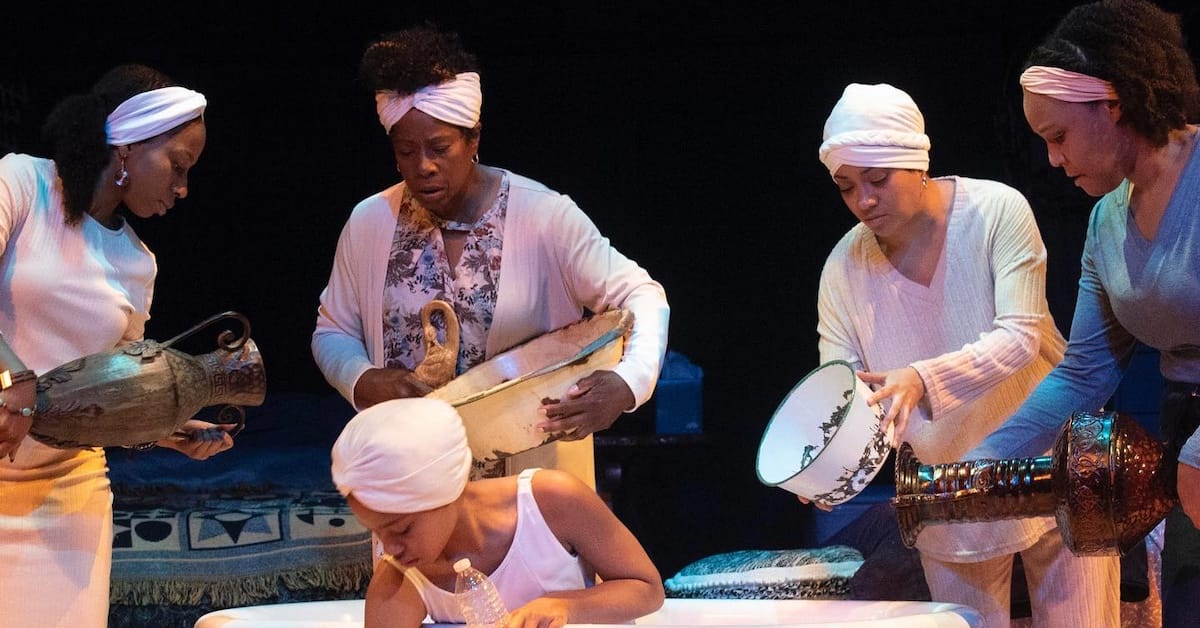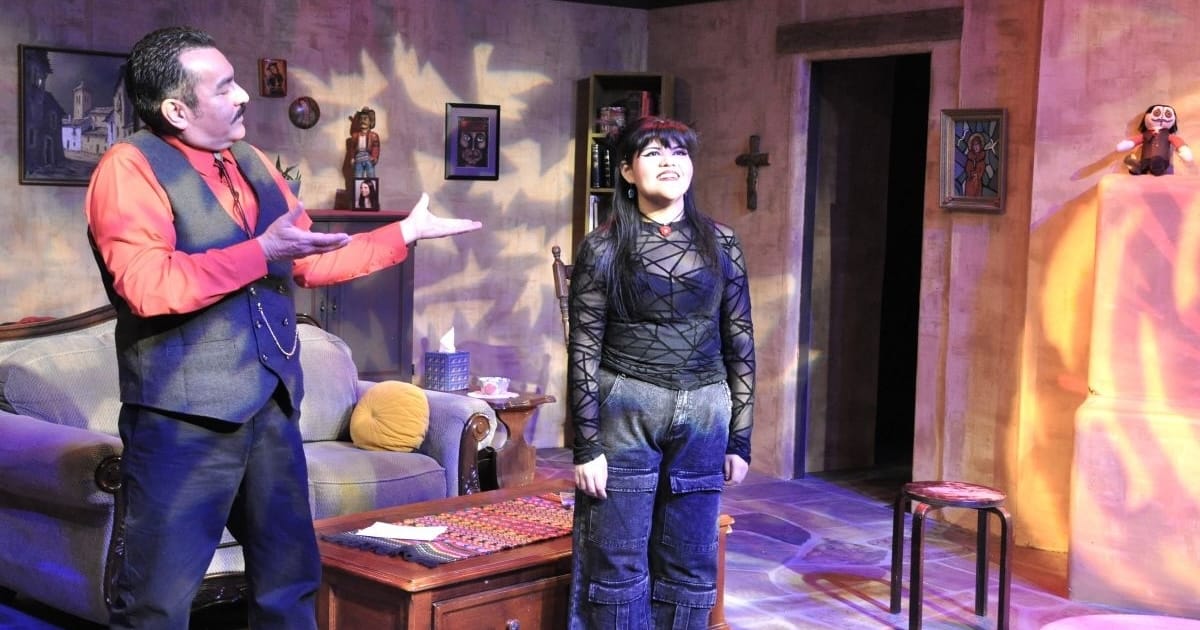Regional premiere of Erika Dickerson-Despenza’s play a slow-moving look at an American tragedy
If ever there were a story ripe for dramatization on stage, it’s the travesty of the Flint water crisis. Perpetrated by uncaring bureaucrats on the people of the predominantly Black Michigan city in the middle of the last decade, it’s a distinctly American tragedy. And unlike many other examples of systemic racism, this one played out in a highly public manner as the country stood aghast and the people of Flint suffered.
To tackle this story, playwright Erica Dickerson-Despanza sets the action in the home of one family of Black women whose experience of the water crisis mirrors their own domestic strife. In the regional premiere now on stage at Denver’s Curious Theatre, the audience is greeted by an elaborate set designed by Tina Anderson that thrusts us right into the home’s main bathroom. Toilet, sink, tub — it’s all there along with accompanying tinkling/flushing/dripping noises throughout to continuously reinforce the primacy of water as a guiding theme.
In this final show of the Curious season, Artistic Director Jada Suzanne Dixon takes the helm with a fine cast of actors portraying a multi-generational family of women struggling to survive amid the typical challenges of a lower-income family with the water crisis layered on top. It’s a solid production of a play instantly recognizable as the kind of story Curious likes to tell.
But Dickerson-Despanza’s script is a challenge to follow in places, with a fair amount of disconnect between the story threads and some quasi-magical elements and time shifting that weigh down the action. And while it’s only two hours with an intermission, the pacing makes the play seem rather long — particularly the first act. In the pressure cooker atmosphere of the home, the playwright doesn’t include many relief valves. There are some humorous bits, yes, but leaning more into the dark comedy aspects would have made it a more entertaining show without compromising the serious subject matter at hand.
If you can get past some of those issues, Cullud Watah is nonetheless possessed of many bright spots, particularly its outstanding cast.

Kristina Fountaine, Daja McLeod, Alex Campbell, Sheryl McCullum, Sade Houston | Photo credit: Michael Ensminger
Other worlds
Cullud Wattah centers around a mother, her two daughters and two granddaughters. The great Sheryl McCallum is the matriarch known only as “Big Ma.” (Big Daddy is long dead.) McCallum is in fine form here, portraying a highly opinionated woman with limited power in a household supported almost entirely by Marion (a rock-solid Alex Campbell), who works at the GM plant. The second daughter is the very pregnant, recovering drug addict Ainee (Kristina Fountaine).
It’s a powerful trio of experienced talent joined by two younger actors to round out this exceptional cast. Marion’s eldest daughter Reesee is that annoyingly precocious teenager exploring her boundaries and firmly convinced she knows more than anyone else around her. Daja McCleod is delightful in the role, portraying Reesee with a distinctly quirky bounce she brings to every line.
As the youngest daughter Plum, Sade Houston — an 8th grade student at Denver School of the Arts — shines brightly in her professional debut. Suffering from leukemia as a result of the lead exposure, Plum is only partly grounded in this world, with a number of scenes that find her drifting into a more distant, spiritual realm. The Flint water crisis disproportionately affected children, and Plum embodies that reality not only by her physical condition but with this other-worldly persona.
The playwright imbues in Plum this ancient sadness borne by Black Americans, particularly women, that’s also accompanied by a wisdom that belies her age. It’s a weighty role that relies on many an unsaid line, and Houston pulls it off beautifully.
The interplay between Big Ma and Ainee is another compelling element of the story. Ainee’s addiction and many poor life choices prior to her pregnancy (father unknown) may put her at the bottom of the pecking order, but we soon learn she’s the one most engaged in holding the household together. While Marion is off working all the time, it’s Ainee watching her daughters, helping with homework and monitoring the water situation.
Fountaine is immensely enjoyable to watch in comic roles, but here she shows great dramatic depth as the conflicted Ainee. While acknowledging the trouble past that’s put her at odds with Big Ma, she’s convincing as a woman on the mend working to reestablish herself while trying to convince her mother she’s changed. After a number of previous miscarriages, she’s hanging everything on bringing this pregnancy successfully to term.
While the water crisis is never far from their thoughts, that narrative often takes back seat to other concerns such as Plum’s health, Ainee’s labor and Marion’s job. The outrage is always there, but Dickerson-Despanza chooses to let it simmer as yet another indignity atop a host of issues the family must contend with. The Flint situation is kept top-of-mind in other ways, particularly with the set design by Anderson includes hundreds of strung-together plastic water bottles hanging from the walls.
As is often the case with Curious Theatre productions, Cullud Watah is a challenging show to watch. Overwrought in places and disjointed in others, the script still manages to stitch together an intriguing tale of strength through adversity. The backdrop could have been a tornado’s aftermath or any number of other crises, but the unifying theme of water — and its lack — brings an organic element to the play that makes it all the more real and approachable on a visceral level. The spiritual elements and gospel bits woven in by the playwright give it a distinctive voice while Smith’s direction makes the most of those details. As a testament to a particularly awful chapter of American history, Cullud Watah succeeds in showing the impact on one particular family far below the headlines. And it underscores the fact that life for many Black families, already challenging enough, can be made immeasurably more difficult by callous, racist bureaucrats.
The characters in Cullud Watah show they’re able to rise above, but the point remains: Why should they have to?
Alex Miller is editor and publisher of OnStage Colorado. He has a long background in journalism, including stints as the top editor at the Vail Daily, Summit Daily News, Summit County Journal, Vail Trail and others. He’s also been an actor, director, playwright, artistic director and theatre board member and has been covering theatre in Colorado since 1995.






[…] by Kristina Fountaine. She’s been on a run lately with a couple of fantastic roles at Curious, Cullud Wattah, and The Confederates — among a number of other roles. Serena is a Black playwright who often […]